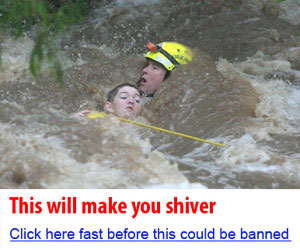How Long Can You Survive Stranded in Flood Waters?
Floods can strike unexpectedly, and being caught in rising water levels can be both a terrifying and life-threatening experience. In such a situation, survival depends on various factors: access to fresh water, food, shelter, and the ability to stay calm under pressure. While no one can predict the exact time you could survive in such a scenario, being well-prepared and knowledgeable could mean the difference between life and death.
The Immediate Threat of Flood Waters
Floodwaters are not just a rising tide. They bring with them powerful currents, hidden debris, and a mix of contaminants that pose serious health risks. The physical impact of the water can cause immediate danger, from drowning to injuries caused by objects swept along with the current. It’s important to understand that the first minutes and hours in floodwaters are critical.
Survival Time: What Affects It?
Several key factors will determine how long someone can survive when stranded in floodwaters. These include:
- Water Temperature: Cold water dramatically reduces survival time. Hypothermia can set in quickly, making it difficult to move and increasing the risk of drowning. In warmer water, this threat is less immediate, but still significant if exposed for extended periods.
- Physical Condition: A person’s physical health plays a crucial role. Those in good health and with high stamina will generally survive longer, but anyone can suffer from the exhaustion of trying to stay afloat or move through floodwaters.
- Access to Fresh Water: Drinking floodwaters is dangerous due to contamination with chemicals, sewage, and debris. Dehydration can set in within hours, especially in hot conditions. Finding or filtering drinkable water is critical.
- Access to Food: While water is the most immediate need, food is also necessary for survival. Depending on the environment, edible plants, insects, or fish could provide sustenance. However, finding food in flood conditions is rarely straightforward.
Dangerous Contaminants in Flood Waters
Floodwaters are often filled with contaminants. Sewage, industrial chemicals, oil, and bacteria all mix into the water, making it hazardous to both touch and ingest. Prolonged exposure can lead to skin infections, gastrointestinal illnesses, or even more severe diseases like leptospirosis or cholera. Proper precautions, such as avoiding open wounds or any direct ingestion of water, are vital for survival. In the aftermath, these contaminants can continue to pose a threat long after the initial flood has passed.
Finding Shelter in Flooded Areas
While floating or wading through floodwaters may be necessary to avoid drowning or escape immediate danger, finding or creating shelter is vital for long-term survival. Remaining in water for extended periods weakens the body and exposes you to elements such as wind, rain, and the sun’s heat. The best option is to seek higher ground or secure structures that are above the waterline. Anything from rooftops, vehicles, or makeshift rafts could offer a safer spot. However, it’s crucial to be aware of secondary dangers, such as weakened structures or rising tides.
Hypothermia and Dehydration: Silent Killers
Hypothermia is a major concern in floodwaters, especially in colder regions. Even if the water doesn’t seem particularly cold, prolonged exposure will sap the body’s core temperature, leading to impaired motor function, confusion, and ultimately unconsciousness. Wearing insulating clothing, staying out of the water as much as possible, and keeping dry can prolong survival time significantly.
On the flip side, dehydration is a threat even in the presence of vast amounts of water. The irony of being surrounded by undrinkable water is one of the most significant challenges of surviving in floodwaters. Without safe drinking water, your body will start shutting down within a few days. Finding or purifying water, whether through filtering floodwater or using natural sources that haven’t been contaminated, is critical.
Signal for Rescue and Communicate
In a flood situation, especially if you’re isolated, getting attention is vital. Keep a whistle, signal mirror, or any bright clothing to make yourself visible. Fire, if possible, serves as both a heat source and a smoke signal. Use cell phones or radios as long as they work to contact emergency services.
How to Stay Safe: Essential Survival Tips
- Stay calm: Panicking will deplete energy faster and cloud your judgment.
- Avoid fast-moving water: Even a small current can sweep you away.
- Stay above the water: Whether in a boat, on a raft, or clinging to a piece of debris, the key is to stay as dry as possible.
- Filter water: If you must drink floodwater, find a way to filter it through cloth or boil it, if possible.
- Signal for help: Don’t assume rescuers will find you. Use any reflective objects, bright clothes, or loud noises to signal for help.
How Long Can the Human Body Last?
Without food, a human can survive for weeks, but without water, the timeline shrinks to just a few days. In floodwaters, where there’s the added challenge of staying afloat, exposure to the elements, and avoiding illness, that timeline may be even shorter. Those who are prepared — mentally and physically — can survive longer, but ultimately, the body has limits. Securing fresh water and dry shelter should be the priority for anyone stranded.
Rescue and Recovery
While surviving the initial flood may be the first challenge, long-term survival depends on eventual rescue. Rescuers may not be able to reach everyone immediately, particularly in widespread disasters. Stay vigilant, look for passing boats, helicopters, or planes, and do everything possible to make your location known. Even after rescue, it is essential to seek medical attention to address any infections or injuries sustained in the flood.
Conclusion
Surviving in floodwaters is not just a matter of floating and hoping for the best. It requires quick thinking, resourcefulness, and the ability to make the most out of a dire situation. While the length of time you can survive depends on many factors — from the environment to your physical state — preparation and knowledge can extend your chances significantly.



